- Free yourselves from mental slavery – part 1
Emancipate yourselves from mental slavery: The origin and meaning behind Bob Marley’s Redemption song.
By Nnamdi Azikiwe
We are going to emancipate ourselves from mental slavery because whilst others might free the body, none but ourselves can free the mind.”
“Redemption Song” by Bob Marley
Those words are widely associated with the lyrics in “Redemption Song” by Robert Nesta (Bob) Marley:
Emancipate yourselves from mental slavery; None but ourselves can free our minds.
The Work That Has Been Done, Marcus Garvey, October 31, 1937, Sydney Nova Scotia
Few know those sentences and thereby the song’s true meaning. Those words can be traced to Marcus Garvey. In fact though Garvey’s movement was disparaged as being a “Back to Africa” movement, Garvey and his supporters refer to it as a movement for “African Redemption,” which has a reference in the song’s title. The earliest known reference to the concept of “African Redemption” can be found in a letter written by Benjamin Lundy on May 28th, 1833. The letter was addressed to the Annual Convention of Free People of Color Convention due to meet in Philadelphia, Pennsylvania. Lundy’s words to that effect are as follows:
A new era has opened upon the world! The “dark age” of African oppression is drawing to its close; and the happy “millennium” of African redemption is near at hand! Let the inhabitants of that ill-fated continent rejoice, and her children wherever scattered, sing praises to the Most High, on the “banks of deliverance.”
In Garvey’s only work that can be considered an actual book “The Philosophy and Opinions of Marcus Garvey” Volume 1 is “Dedicated to the true and loyal members of the Universal Negro Improvement Association in the cause of African redemption.”
Thereby it can be claimed Bob Marley paraphrased Marcus Garvey’s speech “The Work That Has Been Done” for not only that key lyric, but the song’s title as well. The speech is presented in its entirety below.

Marcus Garvey with quote on emancipation from mental slavery, the next stage of human development.
Emancipation from mental slavery
Scientists said once that the Negro was the missing link, but now they realize that the Negro is the oldest man in creation. He is so old that he is black, and everything darkens by age, therefore he could not be the missing link. Something must be missing from his link. That the Negro is old and that accounts for his colour there is a lot behind it. Because once upon a time we were a great people. We built the Pyramids and the Sphinx. When history is written in truth you will find that the first civilization was projected from the Nile on the Congo Basin. In the earliest dawn of civilization you found the Negro in Benin, in Timbuktoo, in Alexandria. Anthropologists will tell you that the Pharoahs were black men. When they dug up the mummy of Tutankamen and saw he was a black man they would not tell you the truth. Civilization went across the north to Europe to India, to China, all the way down and proved that the black man had circumnavigated the world. The North American Indian, the Australian Aboriginal, the Aztecs of South America were all people who became what they were through the contact of Africans who had travelled across the continents when they were carrying their civilization, just as how the great white man is travelling around the world to-day and planting the evidence of his race, but before modern history was written and produced in the different continents there were different shades of colour, each had their original civilization. Like all great people we fell. The present civilization is not the only one that existed, but before this we had Roman civilization, Greek Civilization, Persian civilization, Babylonian civilization, and even medieval Egyptian civilization, but the Negro civilization anti-dated that.
The African went down with his blundering civilization, the Persian, the Greek, the Roman all went down and we do not know how long this civilization will stand with its Mussolinis and its Hitlers. Civilization is a cycle. It changes. I should like to see black and white get on so well toghether that the black man will remember how kind he was. It is the only way we are going to get along because man is man for that.
The white man is no missing link, nor the black man, nor the yellow man either. Surely no animal could achieve what Marconi did, what Edison did, what the great engineers did, what the great scientists did. Surely no man could do what the Japanese are doing, no missing link could do what Carver is doing at Tuskegee. He is the greatest chemist to-day, who can bring out of one product so many chemicals.
No monkey could do what the brown bomber did to the Welshman. If man will let a monkey beat him then he is lower than a monkey. We are men whether we are white, yellow or black, because we have one origin. We came from the same place and we are going back to the same place. The Negro went to sleep for a long while, resting from his labours, but he slept too long, so everybody stole a march on him and therefore he is the only man without a country; and so the U.N.I.A. seeks to restore the Negro to his own vine and fig tree. Economically, for his own interest, the white man will not like it, but deep down in his heart he will say that the Negro is right.
I would like to see Canada for the Canadians, England for the English, America for the Americans and in the same way I want to see Africa for the Africans, those at home and those abroad, so that when we are sick and tired and weary we may lay our heads in the lap of our mother and ask her to comfort us, bless us before we die. Every people should have a flag, a land of their own, and the U.N.I.A. points you to achieve something. A large number of you were and are members and I bring you the greetings of those in the other parts of the world.
We are going to emancipate ourselves from mental slavery because whilst others might free the body, none but ourselves can free the mind. Mind is your only ruler, sovereign.

The man who is not able to develop and use his mind is bound to be the slave of the other man who uses his mind, because man is related to man under all circumstances for good or for ill. If man is not able to protect himself from the other man he should use his mind to good advantage.
The fool will always carry the heavy burden. The fool will always be crushed without a tear from God or man because God Almight never made a fool.
God is all wise. When God Almight made man in His own image and likeness, it wasn’t the physical, it was the mind that was like God. Every man represents God in his unitary intelligence.
When man abuses that intelligence he lowers himself. God has given you intelligence to take care of you. He hasn’t repeated Himself yet. God was so thoughtful of man and his progeny that he made a variety of things so as to pander to the taste of the Adams that would come after the first.
When God made you He made you the masters of the world, not serfs and slaves, but your mind must be developed intelligently. It is your mind that rules the body. You cannot go further than that mind to seek truth and to know truth and to re-act to truth.
That is the only way you will be able to protect your group. The white man is still doing research work with his mind. It has taken him to the bowels of the earth to extract what nature placed there for him. On that same intelligence he has gone into Heaven. What you see in Sydney, in Nova Scotia is only the fringe of the white man’s intelligence. Everything that you see that is methodical is the product of the white man’s mind. He visualizes nations and kingdoms and he has them. There is nothing spiritual around his materialism.
They are all objective things realized, dreamt and thought out. Sydney is only what men have visualized to a greater extent. The British Empire was the visualization of men like Raleigh, and Drake, who seeing things of value, attached them to the mother country. If places are not well protected then men take them and add them to their Empires.
The U.N.I.A. is dreaming of a day when the Negro will possess himself of a homeland, when he will build for himself. The man who cannot build for himself is not only a poor fish in the sea, but ultimately will be a dead fish, plodding for himself.
Nobody wants to die except the fool, because life is a worth-while thing. It is only people who are together can survive now-a-days. It is only by organising that we can get anywhere, as the Mayor told you. We are looking for the redemption and the freedom of our homeland. (We hope, sir, to invite you to Sydney, in Africa, because there we shall have different things than you have in Canada.)
Our obsession is like that of the Jews. They are working for Palestine. We are working for Africa, like the Irishman, he is working for Ireland, and the Canadian is working for a grand and noble Canada. We are helping to send on the great force of power of Canadian industry when the Canadians will realize that they too can help us to do some good as we have been helping them to do some good. We have been helping to build and up to now we are not dead, we have not fallen. The Negro has the power of resistance. He can do the job. I feel sure, as you have done in the past, you will continue in the future, whether I come here or not. Remember the primary purpose that has brought me here — goodwill, co-operation, unity from the rest of your fellows in the United States, Africa and the West Indies. We have celebrated the happiness, the glory of our Organization’s accomplishments. We have had our ups and downs and failures, but that was only a drop in the bucket. If the Mayor were to tell you of the failures of his race, you would wonder at their patience. When the Liberals fail they go out of office and let the Conservatives go in, and the Government goes on. If you Negroes have a penny bank and it fails, you swear that you will never put another penny in it again. You should kick out the first dishonest man and put in an honest one. That is why you will have to it swim to Barbados, Trinidad and Demerara. You know how many times the Canadian Pacific failed until they now have their wonderful system? The only way you can be happy is to lay the foundation in one generation for the succeeding generation. If you do not build ships for the next generation you will always be walking.
Take the white race, sometimes you see an old man president of the bank, knowing well that their grandchildren are coming after them and they are storing up for their generations to come after. Our disposition is to eat everything and let the boy work for his. We cannot treat our children as our fathers treated us, so do not eat up everything you get, for God’s sake. Remember that the boy who is coming up is to carry on until God comes. Do not be here as serfs and slaves because God never made you anything else but men.
Whatever that has happened to the man it is his own mind that puts him there. He has abused the force of power of that mind. Men can create the environment to suit himself. When you do not use your intelligence you fall and will be submerged. It is because we do not live up to the state of our intelligence why we suffer so much.
Before I close, I want to appeal to you to use your intelligence to work out the real things of life. You have to apply that intelligence to the management of your own individual and collective racial affairs. Every race has to lok after its own affairs. You have formulated no legal or moral claim. That is why people are taking away Africa today, just how Mussolini took away Ethiopia because he thought the Ethiopians had no use for it. One man used his intelligence and knocked out while the other tried to pray.
The time you waste in levity, in non-essentials, if you use it properly you will be able to guarantee to your posterity a condition better than you inherited from your forefathers. The U.N.I.A. is carrying throughout the world the message of goodwill. The message is going on. It has reached you. It will go to others, so that we may have one outlook, one purpose in life. I do hope the friendship will continue, sir, economically, politically and that you will never have cause to believe that we are not what we seem. (Cheers.)
The Chairman, Rev. Ford: Speaking on behalf of the peoples of this community permit me to say that hey have enjoyed this message of goodwill immensely. Please take back for us the message that we, in Cape Breton, shall stretch out the curtains of our habitation with this in view — one God, one aim, one destiny. I have spent over six years in college learning the various ologies, but to-night you have taught me one ology and that is Negro ology. The hon. Marcus Garvey told you to-night that the man who doesn’t love his people cannot love his God. This is an epoch-making event. Let us bind ourselves together, not only when he is here, but when he is gone, so that we may be lifted up with wings as he goes.
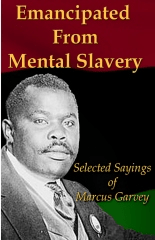
This book is a distillation of Garvey thought. The product of years studying the words works and deeds of a man who left a legacy that is still so potent efforts continue to dissuade seekers of truth from his vision. Visit us on line at http://www.keyamsha.com to get the latest about Keyamsha, the Awakening.
Keyamsha The Awakening: 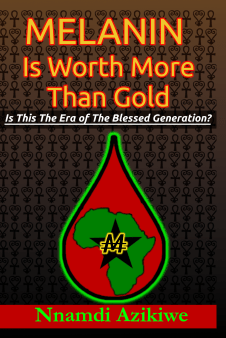 Nnamdi Azikiwe takes readers on a “whirlwind” journey revealing a new era has begun in the book “Melanin Is Worth More Than Gold: Is This The Era of The Blessed Generation?” Not just “pigment” or “color,” melanin is an aromatic bio-polymer and organic semiconductor presently worth over $380 a gram more than gold. The Red, Black and Green flag is 100 years old. The Afric, official currency of the United States of Africa or the African Union is worth over $2. What else is necessary to know a new era is taking place making us the blessed generation as you read this?
Nnamdi Azikiwe takes readers on a “whirlwind” journey revealing a new era has begun in the book “Melanin Is Worth More Than Gold: Is This The Era of The Blessed Generation?” Not just “pigment” or “color,” melanin is an aromatic bio-polymer and organic semiconductor presently worth over $380 a gram more than gold. The Red, Black and Green flag is 100 years old. The Afric, official currency of the United States of Africa or the African Union is worth over $2. What else is necessary to know a new era is taking place making us the blessed generation as you read this?
- I can’t Breathe” is the expression of the Crisis of the modern world.

“I can’t breathe“ is sure the slogan associated with the Black Lives Matter movement in the United States. The phrase is derived from the words of Eric Garner and George Floyd, two African-American men who died of asphyxiation during their arrests in 2014 and 2020, respectively, as a result of excessive force by primarily white police officers. The phrase is used in protest against police brutality in the United States.
But this protest, this Cry show us the real problem of the Modern man:
Modern man is a human without Soul, without the “Living Breath”.
The protest is the expression of his deep spiritual Crisis in the times of deep ignorance.. Read more here
- Free yourselves from mental slavery – part 2
“The crisis in sense, meaning, and identity doesn’t just push people into cults and conspiracy theories, it also makes mainstream belief systems more cult-like.”
-
-
- From QAnon’s Dark Mirror, Hope
-

A dark mirror shows features one would rather not see. You gaze at the repulsive visage in the picture frame, the caricature of everything despicable, only to realize with dawning horror that you are looking not at a portrait but at a mirror.
The political defeat of Donald Trump in the 2020 election is a crossroads for the quasi-political movement grouped loosely around the QAnon conspiracy myth and, more broadly, around Trump himself. Because the man and the movement were a dark mirror for the whole of society, it is also a crossroads for society.
For those unfamiliar with it, the QAnon movement started early in the Trump administration when a mysterious person, calling himself Q and claiming to be an administration insider, began posting cryptic messages on internet message boards, particularly 8Chan. These consisted of hints and promises that Donald Trump was executing a masterly plan to vanquish his enemies, uproot the Deep State, and restore America to greatness. Their mantra, by which followers (call QAnons) kept the faith, was “Trust the plan.” However bad it looked for Trump, victory was just around the corner.
At the present writing (late November, 2020) it would seem that the QAnons would have no choice but to abandon the faith. Not so. In various corners of the right wing alternative media, one may still read desperate theories about how Trump’s apparent defeat is a ploy to set up his master stroke. Even after he is deposed, even if he goes to prison, the myth will only change shape, since it is merely an outcropping of a much larger, long-established mythos, driven by repressed social and psychological forces. The same holds for Trumpism generally. It is thus important to gaze into this dark mirror and see what has been hidden; otherwise we will face one of two grim possibilities, each worse than the other. (1) In a few years a new and more formidable demagogue will arise to channel the repressed forces toward a fascist coup. (2) A neoliberal corporatocracy, costumed in the garb of progressive values, will consolidate its already well-developed powers of surveillance, censorship, and control to establish a techno-totalitarian state that will attempt to repress those forces forever.
I would like to offer another alternative that becomes possible when we look into the mirror and meet the aforementioned repressed forces at their source. Healing, rather than victory, is its formative ideal. I call it the more beautiful world our hearts know is possible.
A Comforting Mythology
It is understandable why so many people have celebrated the defeat of Trump, a man who presided over the deliberate separation of immigrant children from their parents, who needlessly provoked Russia and China, who gave free pass to some of the worst of American’s racist tendencies, who green-lighted new levels of environmental destruction, who pushed regime-change operations in Venezuela and Bolivia, and so on. Yet it is also true that the incoming Biden administration is rife with Wall Street insiders, neocon war hawks, intelligence agency officials, prison-industrial complex cheerleaders, and representatives of Big Pharma, Big Data, and pretty much Big Everything. Neither Joe Biden nor the Democratic Party has been a particularly effective champion of racial equity, environmental protection, economic fairness, or world peace for a very long time. Biden himself cavorted with overt racists in his early career, was a key architect of mass incarceration, has been a consistent supporter of America’s foreign wars, and has done numerous favors for Wall Street. An unpleasant surprise awaits anyone who thinks that much will improve now that the bad guys are out and the good guys are in.
It would be convenient if the problem with America were Donald Trump, bad people who worked with him, and ignoramuses and dupes who supported him. If so, we could breathe a sigh of relief that with the election a victory over evil has been won.
Ironically, the ideology of QAnon is an exaggerated version of this same basic thoughtform. It says that a group of diabolical people are responsible for the evil in the world, and that if they could be expunged, the world could be healed. In QAnon’s mythology, the locus of evil is the Deep State, an elite cabal interpenetrating government, corporations, banks, and other elite institutions, and the champion of Good is Donald Trump who, with superhuman subtlety, foresight, and skill, wages a 4D chess struggle against them.
The QAnon mythology offers three degrees of comfort. First, at a time of social and economic breakdown, it assuages the discomfort of uncertainty by making the world understandable. Second, it absolves its followers of complicity in the problem (in contrast to blaming reigning systems, which implicate pretty much everyone to some extent and admits no ready solution). Third, it offers a hero, a savior, a Good Father who will set things aright, and upon whom one might project one’s own unfulfilled expression of greatness.
It is so tempting to personify good and evil, to locate each in the person of whomever appears most conspicuously in the dramas offered for our consumption. One side holds Donald Trump in exactly the same way that the other holds George Soros and Bill Gates. Personifying evil offers the comfort of knowing at least in principle how to solve the world’s problems. There is someone to destroy, to expunge, to defeat, to cancel, or to silence. Problem solved. The standard Hollywood movie script is also the script for war and also, it seems, the script for a lot of today’s political discourse.

I have been counseled to issue a public denunciation of QAnon, to which I reply that I am not in the business of denouncing anyone. In clarifying who is friend and who is foe, denunciation reduces the target to the status of enemy. I won’t take sides in the culture war, not because I think both sides are equal or that all viewpoints are equally true, but because (1) I believe that the blind spots both sides share are more significant, and more dangerous, than their disagreements, and (2) Beneath the conflict is a hidden unity that will emerge when all parties humbly try to understand the other.
QAnon has done considerable damage to people’s lives and to the body politic in the context of Trumpian neofascism and persistent systemic racism. Yet to reduce it and its followers entirely to those terms is to commit the same error – and derive much the same comfort – that QAnon itself does in its reduction of a complex situation to a drama of good versus evil. In doing that we sacrifice real understanding in favor of a narrative that divides the world into good guys and bad guys.
Daniel Schmactenberger puts it well when he says, “If you feel a combination of outraged, scared, emotional, and very certain with a strong enemy hypothesis, you have been captured by somebody’s narrative warfare, and you think it’s your own thinking.” Visit the enemy territory, he counsels, and see what the world looks like from there.
Who among their critics asks, “What hidden truth seeks expression in the QAnon phenomenon? What truth rides upon its myths?” In an essay last spring, I catalogued some truths that ride the New World Order conspiracy myth (of which QAnon is a variant); for example, that an inhuman power rules the world; that those we call leaders are its puppets; that established authority has betrayed our trust. In it I wrote:
The conspiracy myth embodies the realization of a profound disconnect between the public postures of our leaders and their true motivations and plans. It bespeaks a political culture that is opaque to the ordinary citizen, a world of secrecy, image, PR, spin, optics, talking points, perception management, narrative management, and information warfare. No wonder people suspect that there is another reality operating behind the curtains.
That QAnon is rife with Islamophobia, racism, and other flavors of bigotry does not erase the validity of these basic intuitions. It does, though, illustrate the tragic nature of the QAnon phenomenon, which diverts an authentic populist revolt onto vain dreams and ready divisions. This is also, in part, the tragedy of Donald Trump. Much of what I will say about QAnon applies to Trumpism in general.

The simplifying explanation for why so many people voted for Donald Trump is that he gives vent to their covert racism, hate, and fear. Certainly, the United States is home to many inveterate racists, and racism to this day exerts a baleful influence on American society. However, the caricature of the racist Trump voter resentful of his declining status relative to people of color and hoping to uphold his dominance and privilege against progressive social trends leaves out a lot. It does not explain why millions of Obama voters voted for Trump in 2016 and presumably 2020. It does not explain why Trump won a greater percentage of minority votes than any Republican candidate since 1960, while his support among white men declined from 2016 to 2020. Invoking racism to explain away the Trump phenomenon prevents us from looking at an anti-establishment sentiment so intense that 74 million people would vote for a man who so often gives the appearance of being coarse, boastful, ignorant, phony, vain, corrupt, and incompetent.
If we continue to leave out all these things, I fear that sooner or later we will be confronted with an aspiring fascist who is younger, smoother, more charismatic, and more competent than Donald Trump. If we don’t accurately understand and address the root cause of Trumpism, that is what will happen in 2024. If Trump could almost win in 2020, imagine what such a man or woman could accomplish if the repressed forces that elevated Trump intensify.
Addictions and Cults
Hungry for what? Obviously something much more nourishing than what Q’s stories provided. That is why QAnon and the mythology from which it draws is so addictive (anything can be addictive that temporarily quells the pain of an unmet need without actually meeting it). Thus, QAnons went down the proverbial rabbit hole, eagerly awaiting their next fix of a Q post, shedding friends, alienating family, losing sleep, squandering countless unproductive hours to get one hit after another of indignation, feelings of superiority, assurance that they are right, and the above-mentioned comfort. Friends and family speak of losing loved ones to QAnon just as they speak of losing them to an addiction or a cult.
QAnon indeed displays many features of a cult. It draws people into an alternate reality, estranges them from friends and family, and exploits their need to belong. It attaches them to an in-group of believers, membership in which is completely dependent on what one says and believes (rather than acceptance for who one is). However, to understand QAnon and cults in general as parasites on the social body risks ignoring the conditions that invite those parasites in to begin with. Do we want merely to suppress the current outbreak? What will it take to heal the social body on a deeper level?
Cults prey upon the vulnerable. What makes someone vulnerable? First, a disintegration of a belief system that told a person who she is, how the world works, and what is real. Second, an unmet need to belong. The perfect candidate for cult recruitment is someone whose world has fallen apart, leaving them lonely and confused. It isn’t weak and stupid people who fall into cults. Anyone who holds a sanctimonious attitude toward QAnons and “conspiracy theorists” is deluding themselves.
I say this to remedy any sense of superiority one might obtain from reading my description of the false comforts of the QAnon mythology. Does it feel good to diagnose others’ spiritual pathologies? If so, it could be because we ourselves suffer a version of the same hunger we see in the dark mirror of QAnon. But really, who among us today has not suffered a breakdown in meaning or an unmet need to belong?

Today, a majority of society are prime candidates for cult recruitment. Our societal meaning-generating stories are in disarray. Fifty years ago, a broad mainstream of Western society believed in the march of progress. The world was getting better year by year and generation by generation. Soon, technological progress, liberal democracy, free market capitalism, and the social sciences would eliminate the age-old scourges of humankind: poverty, oppression, disease, crime, and hunger. Within that story, we knew who we were and how to make sense of the world. Life made sense within a linear narrative of progress that told us where we came from and where we were going.
The mythology of progress, of which the United States of America was the foremost paragon, told us life was supposed to get better with each generation. Instead, the opposite has happened. The mythology of progress told us of an age of plenty, yet today we have extreme income inequality and persistent or growing poverty in the West. It told us we would be healthier with each passing generation; again, the opposite has happened, as chronic diseases now afflict all age groups at unprecedented levels. It told us that the onward march of reason and rule of law would bring an end to war, crime, and tyranny, but levels of hate and violence have not dropped in the 21st century. It told us of an age of leisure, yet the workweek and vacation time has stagnated since the mid-20th century. It promised us happiness, yet today rates of divorce, depression, suicide, and addiction rise with each passing year.
Adding to all of this an undeniable ecological crisis, it is hard now to fully embrace the mythology of progress as a source of meaning and identity. With its failure to deliver on its promises, the wellspring of meaning for modern society now runs dry.
The resulting crisis in sense, meaning, and identity doesn’t just push people into cults and conspiracy theories, it also makes mainstream belief systems more cult-like. To some degree, major news outlets and social media provide exactly what the QAnon addiction did (indignation, feelings of superiority, assurance that they are right…) They also tend to “draw people into an alternate reality, estrange them from friends and family, and exploit their need to belong.” How many family gatherings are ruined, how many family members are no longer on speaking terms, having dissociated into separate realities?
Indulge me for a moment in a little rhetorical exaggeration. In the United States, two dominant cults apply the tools of information warfare to vie for public loyalty: (1) the Democratic Party, New York Times, MSNBC, NPR, CNN cult, and (2) the Republican Party, Fox News, Breitbart cult. Each offers its followers the same comforts as Q: they offer a narrative that makes sense of the world in the midst of change; they offer a diagnosis of social problems that exculpates themselves, and they offer people to cheer for, champions for the cause of victory over evil. They also offer a sense of belonging. Have you ever felt a sense of homecoming when you tune into your favorite pundit or website?
Note: The Battle about Money (1570): Money and Excrement
The Psychology of Capital and the Marketplace in Pieter Bruegel the Elder’s `Dulle Griet’
The Antwerp stock exchange, the Bourse, controlled the wealth of Europe, and in mid-century it was at the height of a boom. This boom was founded on new forms of credit, necessary to finance the high risks of sea-trading. The shift to credit allowed merchants to defer and interweave the consequences of their ventures, and citizens became used to the psychology of gambling on future profits. Like modern trading-floors, the Bourse was no sober club. Incidents of violence were not unknown and the building it-self (new in 1531) was plagued by vandalism and graffiti. It was a centre for gossip and scandal of all kinds. Read more here…

The unprecedented, and somewhat enigmatic, iconography of this image derives from the fertile imagination of Pieter Bruegel the Elder, who executed the original drawing after which this was engraved. Strongboxes, piggy banks, money bags, barrels of coins, and treasure chests—most of them heavily armed with swords, knives, and lances—attack each other in a ferocious display of chaotic, all-out warfare. The Dutch verses inscribed in the lower margin inform us that “It’s all for money and goods, this fighting and quarreling.” According to the Latin portion of the inscription, the banner with the “savage grappling hook” in the right background exemplifies greed, the vice at the root of all this trouble. The image seems to suggest that humanity’s lust for money is responsible for armed conflict. The concerns for the dangers of acquisitiveness and avarice expressed here had deep resonance in Antwerp, the bustling mercantile capital of Northern Europe where Bruegel was active for most of his career. Though inscribed “P. Bruegel” in the lower right corner, the engraving was probably not published until several years after the artist’s death in 1569.
Cults, armies, and police states depend on the control of information. As warring parties weaponize facts, we learn to discount all sources of information. We wonder what agenda lies behind a given “fact.” Knowing that narrative warriors select, distort, or invent facts, the canny citizen tends to ask “Who said it?” before asking “What did they say?” and then to disbelieve what they said if it serves a disagreeable party or purpose. In such circumstances, how is any conversation possible?
The routine mendacity of politicians over the last few decades has desolated the civic commons, once a rich domain of broad agreements about what is real, what is important, and what is legitimate. We can’t blame only the politicians of course. From corporate PR campaigns to intelligence agency psy-ops, from internet censorship to government secret programs, we are awash in lies, deception, secrets, half-truths, spin, fraud, and manipulation. No wonder we are so prone to believe in conspiracies. Their building blocks are everywhere.
Here is the dark mirror. The rise in conspiracy theories reflects a power establishment shrouded in lies and secrets, which viciously persecutes anyone who, like Edward Snowden and Julian Assange, pulls aside the veil.

Note:To See Yourself within It: Bruegel’s Festival of Fools
Although fairly subtle, the composition of the Festival of Fools stages a
procession similar to a wagon play. (Wagon plays were processional dramas that took place during Ommegangen (devotional processions) in the 1550s and 1560s. Rhetoricians conceived of wagon plays as didactic episodes that could morally
edify and educate their audience. The plays utilized overt metaphors and personifications to create allegorical productions that focused on collective civic identity.
This crisis in communication and sense-making has been long in the making. The attempt to bend truth to serve other ends has harmed the soul of language, diverting the creative power of word toward the maintenance of illusions. Consequently, our society as a whole is helpless to change its course. That would require agreement, the building blocks of which have turned to sand. I have watched this paralysis intensify for 20 years now. In 2007 I wrote an essay called The Ubiquitous Matrix of Lies, in which I said, “As we acclimate to a ubiquitous matrix of lies, words mean less and less to us, and we don’t believe anything any more. As well we shouldn’t! We are facing a crisis of language that underlies and mirrors all the other converging crises of the modern age.”
Our main engines of knowledge production – science, journalism, and the arts – once enjoyed robust, near-universal social legitimacy. Now each cult gleans through the stubble of the knowledge commons for grains of still-agreed upon fact to add to its army’s granary. The warring parties swiftly requisition any new crops the independent scientist, journalist, or philosopher might sow. If they resist, their crop is burned to the ground. Thus it is that the best journalists today are all independent or contribute to marginal publications: Matt Taibbi, Glenn Greenwald, Diana Johnstone, Seymour Hersch…. They defy both cults’ narrative (Right and Left) and therefore, because they disabuse us of the caricature taped over the mirror, give us a chance to see some dark truths.
When Hate Hijacks Anger
The crisis in meaning has direct economic causes. It is hard to believe in the social project when one is economically insecure, politically disenfranchised, stripped of dignity, and cut off from participation in society as a full member. This has long been the condition of African-American and other brown people in America, along with women and those who deviated from social norms. Today, the same economic forces that required their oppression and profited from it have turned toward the white middle class. The Machine that once depended on white racism to maintain a brown underclass now devours its own, chewing up vasts swaths of middle America and spitting the gristle and bones onto the trash heap of disenfranchised irrelevancy.

Note: Big fish eating small fish:A broadside criticising the exploitation of political power by alluding to the proverb of big fish eating small fish; with an engraving with motives after Pieter van der Heyden after Pieter Bruegel showing in the centre a table with a large dish of small fish, around the table are sitting five large fish with human arms, dressed in clothes and devouring the small fish, the table scene surrounded by various scenes of larger fish being cut open, revealing smaller fish, in the background small fish hanging on the gallows; with engraved title and text.
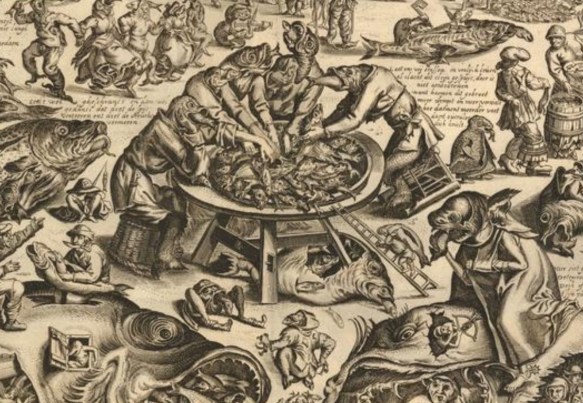
Do I hear the reader protest at my drawing an equivalency between oppressed minorities, who have only external circumstances to blame for their poverty and despair, and the mostly white QAnons who, despite having so much more privilege, wallow in their white fragility, blaming everyone but themselves for their dead end lives, their involuntary celibacy, and their video game addictions? This kind of sanctimonious assessment, which is common in left-leaning social media comment threads, mirrors exactly standard racist canards about lazy, irresponsible black people who blame the system and refuse to take personal responsibility. Both refuse to look at the conditions that generate the choices they condemn.
The relevant question here is not who has suffered more, who is the biggest victim, who is the most oppressed and therefore the most deserving of compassion. The question is rather, What are the conditions that gave rise to Trumpism, and how do we change those? We must ask this question, unless our strategy is to be endless war against those we deem irremediably evil.
Watching an interview with the extremely penitent founder of 8chan (QAnon’s main forum), Frederick Brennan, I was moved by his description of typical 8chan users, particularly the “Incels” and those who’ve swallowed the “black pill.” The former term refers to men who are involuntarily celibate; the latter refers to nihilism. These by no means define the entire QAnon movement, but they offer a window to some of the social traumas driving it.

Displaying varying degrees of misogyny, the Incels draw a lot of condemnation. They are denounced for believing themselves “entitled to sex,” and reviled for displacing blame for their own failings onto women. We can denounce them and fight them online, call them out and cancel them, but can we see them as human? Can we see their frustrated yearning to love a woman, to raise a family, to contribute meaningfully to life? Frustrated desire naturally turns to violence, directed at others or oneself or both.
Again I hear a protest, “Fine for you as a straight white male to call for compassion for these perpetrators and their avatar, the perpetrator-in-chief Donald Trump, but what about compassion for the victims? They need it even more.” To that I say: as a matter of sheer practicality, it is precisely compassion for the victims that requires compassion for the perpetrators. Compassion enables us to quell the violence at its source. Compassion isn’t the same as giving someone a free pass or allowing them to continue harming others. Compassion is the understanding of another being’s inner and outer condition. With this understanding, one can effectively change the conditions that generate harm. It is precisely the same logic that leftists use when talking about crime. Instead of waging an endless war on criminals, let’s look at the conditions that breed crime. What makes someone a drug dealer, a robber, a gang member? What conditions of trauma and poverty? Following the trail of these questions, one may arrive at root-level responses.

Whether we are talking about the inner city youth growing up in extreme trauma and deprivation, or the white Incel living in his parents’ basement with only his despair, his student debt, and his video games for company, we must be careful not to impute helplessness onto these victims of circumstance. There is no circumstance too oppressive for the human being to transcend. There is a place for messages like “Stop being a victim. Take ownership of your life. Stop asking for charity.” Crucially though, these messages will be useless, counterproductive even, if they come from a place of superiority or disgust. It cannot be, for example, the privileged white person telling the ghetto dweller to get his act together. Such messages have to come from a full appreciation of the anguish and misery of the oppressed condition, and a genuine vision of the greatness of those in it. Yes, greatness. It is hypocritical and pointless to call someone to greatness without believing in their greatness. And this belief cannot be a mere spiritual ideology. For these reasons, usually it is only other black people who can effectively exhort African-Americans to take responsibility for raising themselves up, and it is usually other men who can do the same for the Incels. I know people who say their lives were saved from addiction and despair by this kind of “tough love.” We just have to keep in mind both words of that phrase: the love as well as the toughness. If you secretly despise those you are trying to help with your tough love, you will hinder not help. To transcend one’s conditions requires courage. It is a lot easier to be brave when someone knows you are brave.

One of my favorite quotes, by Viktor Frankl, will help illustrate these points: “We who lived in concentration camps can remember the men who walked through the huts comforting others, giving away their last piece of bread. They may have been few in number, but they offer sufficient proof that everything can be taken from a man but one thing: the last of the human freedoms – to choose one’s attitude in any given set of circumstances, to choose one’s own way.” One can feel truth ringing through these words. Yet obviously, their application would not be to visit a concentration camp, quote it to the prisoners, and then walk away. The right application is to one’s own circumstances. The words ring the bell of bravery; having acted from it, one may then ring it for others who may be in similar circumstances.
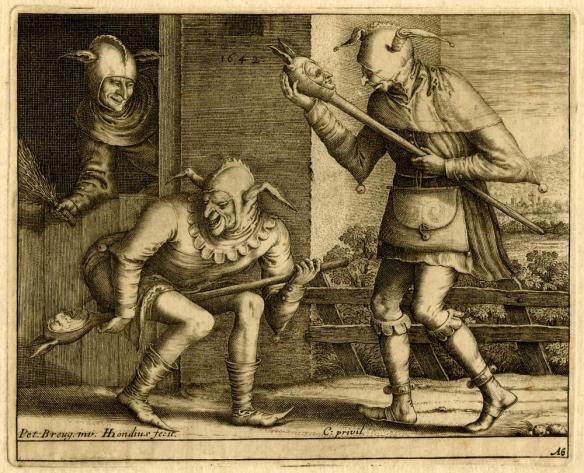
Let’s be clear that compassion is not the absence of anger. I am not asking the abused or the oppressed not to be angry. Quite the contrary – anger is a sacred force. It arises in response to confinement, violation, or threat (to oneself or in witness to another). It is key to social change, because it supplies the energy and courage to break free of familiar holding patterns.
Note: Tulip mania

Tulip mania(Dutch: tulpenmanie) was a period during the Dutch Golden Age when contract prices for some bulbs of the recently introduced and fashionable tulip reached extraordinarily high levels, and then dramatically collapsed in February 1637.[2] It is generally considered to have been the first recorded speculative bubble (or asset bubble) in history.[3] In many ways, the tulip mania was more of a hitherto unknown socio-economic phenomenon than a significant economic crisis. It had no critical influence on the prosperity of the Dutch Republic, which was the world’s leading economic and financial power in the 17th century, with the highest per capita income in the world from about 1600 to 1720.[4][5][6] The term “tulip mania” is now often used metaphorically to refer to any large economic bubble when asset prices deviate from intrinsic values.
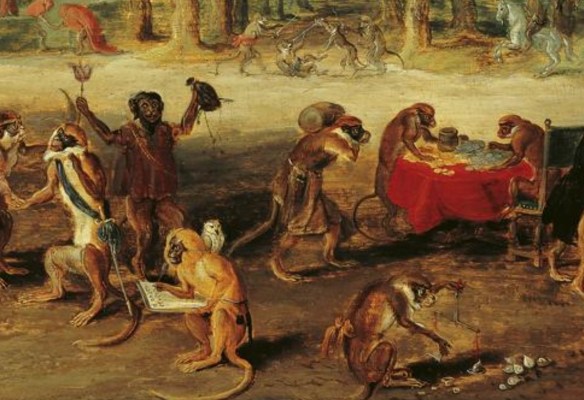
Hate is the result of a narrative hijacking anger and channeling it onto convenient enemies. Hate preserves the status quo. Dr. Martin Luther King once said, “Somewhere somebody must have some sense. Men must see that force begets force, hate begets hate, toughness begets toughness. And it is all a descending spiral, ultimately ending in destruction for all and everybody. Somebody must have sense enough and morality enough to cut off the chain of hate and the chain of evil in the universe. And you do that by love.”

Once anger becomes hate, one no longer has an accurate understanding of the situation. Hate interposes a projection in front of an adversary, making them appear both more terrible and more contemptible than they actually are. Therefore, hate is an obstacle to victory in a fight. To win, one must be in reality, accurately understanding the opponent. With that understanding, the fight may no longer be necessary – another response may present itself.

Or not. Sometimes forceful intervention is necessary to prevent harm. Sometimes the abused, the persecuted, the oppressed need to fight back, go to court, run away, or enforce a boundary. Sometimes they need allies in doing that. Sometimes abusers need to be physically restrained so that they do no further harm. But when it comes from hate rather than anger, the goal of force undergoes a subtle shift. It becomes no longer to stop harm, but to inflict harm – to avenge, to punish, to dominate – in the name of stopping harm. To quote Dr. King once again, “Like an unchecked cancer, hate corrodes the personality and eats away its vital unity. Hate destroys a man’s sense of values and his objectivity. It causes him to describe the beautiful as ugly and the ugly as beautiful, and to confuse the true with the false and the false with the true.” Please meditate on these words. It looks to me like such a cancer is spreading in America, with precisely the effects on its national “personality” that King predicted.

In the end, the formula for “saving the world” cannot be victory in an epic battle of Good versus Evil. (That in fact is QAnon’s formula.) Since the two sides appear, from the close election, to be nearly equal, if it comes to war then Good, in order to overcome Evil, must become better at war than Evil – better at violence, better at manipulation, better at propaganda, better at deception. In other words, it must cease to be Good. How many times have we seen this play out in history, when the people’s liberation movement becomes the new tyranny?
`hij wil altijd het onderste uit de kan halen‘ (he always wants to get the most out of it)
Already it is happening. In my youth it was the conservatives who were the main instigators of censorship, burning Beatles albums, removing evolution from science textbooks, suppressing sexuality in literature. They were also the main manufacturers of consent, manipulating the media to maintain a state of constant war. Now it is the “left” who has most enthusiastically taken up the weapons of information warfare, with its deplatforming campaigns, cancel culture, and suppression of dissent. I put “left” in quotation marks because the actual left was the first victim of the new censorship, which began with the demotion of socialist and anti-war websites in Google search and social media. Facebook and Google still suppress this type of website by giving weight in their algorithms to “authoritative sources”; that is, the voice of the authorities. Now the ranks of the censored expand to include alternative medicine sites, vaccine skeptics, critics of 5G technology, and dissenters from Covid-19 public health policy.

Bry Moneybag Flatterers-
Surely, some of those censored are purveying false information; just as surely, not all of it is false. True or false, the suppressed viewpoints have one thing in common – they clash with the narratives and interests of established corporate and political powers. Properly speaking, opposition to those powers defines the left, not the right. It is as if we are approaching a political pole reversal. As with reversal of earth’s magnetic poles, considerable chaos precedes such a realignment. It hasn’t happened yet, but I wouldn’t be surprised if in a few years the Republican Party becomes the party of the poor and working class, while the Democratic Party becomes the chief representative of the elites, Wall Street, large corporations, and the military-industrial complex. Judging by Joe Biden’s cabinet picks, this process is well underway. That would be a welcome change from the situation of the past 30 years, in which both parties give lip service to the people while serving the interests of the corporate-financial-military elite.
Note: In The Bear, the Harlot, the Magician and the King Lloyd D. Graham explains the source of Carnaval and the period of change from winter to Spring.
 The “ insurrection “of januari 6th 2021 in USA Capitol is an expression of the deep rooted origins of the folklores Carnaval and Krampus,
The “ insurrection “of januari 6th 2021 in USA Capitol is an expression of the deep rooted origins of the folklores Carnaval and Krampus,
6 januari is the feast of Epiphany
HERE FOLLOWETH THE FEAST OF THE EPIPHANY OF OUR LORD AND OF THE THREE KINGS from Golden Legends

On this day we are making King cakes . They come with cardboard “crowns” to be worn by whoever gets the slice with the token and becomes monarch of the event.









The Bear, the Harlot, the Magician and the King by Lloyd D. Graham
In the Epic of Gilgamesh, the seduction of the wild man Enkidu by Shamhat the
harlot symbolically causes his death as an unreflective animal and his rebirth as a
human – an Eden-like fall into self-awareness. Created as a match for king
Gilgamesh of Uruk, Enkidu goes on to become the king’s beloved friend. In
European folk traditions, the Wild Man is interchangeable with the bear, and
parallels can be drawn between Enkidu and the Candlemas Bear associated with
Carnival. Since Enkidu symbolises our pre-human nature, one can perceive a
figurative truth to the pan-European folk belief that people are descended from bears.
Thematic overlaps exist between some Gilgamesh narratives and European folk-tales
about a Wild Man whose father was a bear (the Bear’s Son / Jean de l’Ours motif) or
about twin boys, one of whom was raised in the wild by a female bear (Valentine and
Orson). Perhaps surprisingly, the roots of Santa Claus lie in the Wild Man. So too do
the origins of Merlin, the wizard of medieval Arthurian romance. Merlin has
elements in common with Enkidu, while King Arthur can be seen as a metaphorical
“Bear’s son.” Over time, the status of the Wild Man has changed from a wholly
inhuman monster to a “noble savage” who today might even be cast as a salvific ecowarrior. Read here




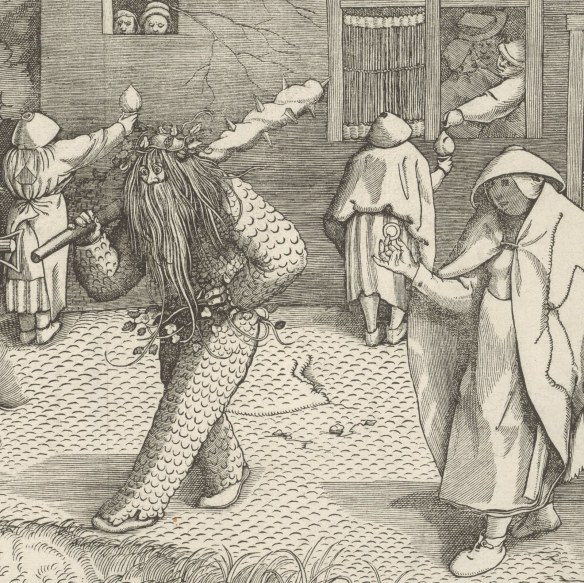
The Wild Man or the Masquerade of Orson and Valentine – Brueghel
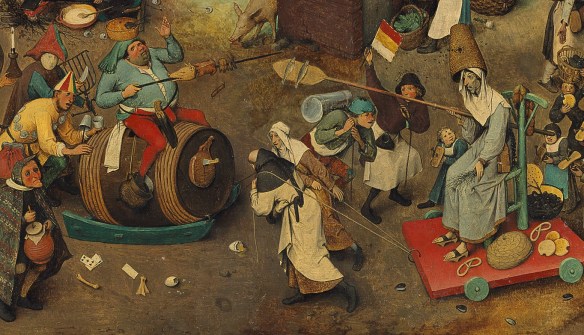



Redeeming the Black Pill
Earlier I used the term the “Black Pill.” Nihilism, of course, is no mere philosophical position, but the intellectual window-dressing on a psychological state of despair. In fact, this despair is always latent in modern society, because (1) Its reigning reductionism renders the universe into a meaningless scribble of atoms and void; (2) Its reigning theory of life tells us we are here to survive and reproduce; (3) Its reigning economics directs our creative energies toward unfulfilling work and mindless consumption, and (4) Its dominant social patterns cut us off from nature, community, place, and the experience of belonging. For a while, rapid increases in wealth and dazzling technical achievements kept the despair at bay. But it was there all long, a gnawing void at the heart of the ideology of progress. It was there all along, an inner poverty mirroring the destitution progress had wreaked upon other cultures and non-human beings. It was there all along, our own shadow that followed us as we raced toward a Utopia ever just at the horizon. Now as the glamour of progress dissolves, as our exhaustion mounts, and as we face the sobering realization that the horizon grows no closer no matter how fast we run, despair overtakes us at last.
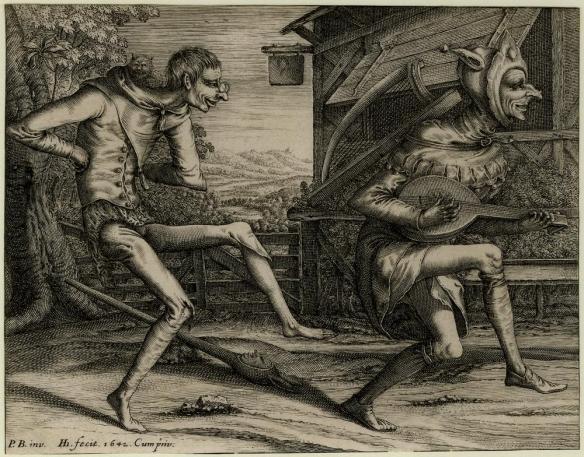
Nihilism is a natural response to the shoddy and tired myths offered to us as sources of meaning. How many of us have had experiences directly contradicting what our main epistemic authority (science) tells us is possible? How many of us sequester narrative-busting data points in a separate mental compartment, living more or less in official reality but unable to wholeheartedly believe in it?
One reason that cults and conspiracy theories are so compelling is that they gather threads snipped away from official reality and weave them into another fabric. Some of those threads may have been snipped because they are simply untrue, and have no place in anyone’s reality. Others may have been snipped because they clash with the color scheme of the main fabric; that is, they disturb reigning institutions and paradigms. These are the threads we must weave into any tapestry of meaning that could be a satisfying successor to today’s dominant political narratives.
What I am saying is that some of the claims that weave through the conspiracy narrative merit attention. The delusional nature of the narrative does not invalidate all of its threads, and we should not dismiss everything conspiracy theorists say just because they said it – especially when our information gatekeepers malign and suppress genuine dissent as conspiracy theories, disinformation, and Russian propaganda.
Starting in 2017, the US government issued a series of disclosures of numerous UFO sightings by trained military observers, sometimes accompanied by video. Basically, it confirmed a theory that it and the mainstream media had for decades vigorously ridiculed as the province of cranks, crackpots, and conspiracy theorists. This revelation joins numerous other publicly acknowledged government and corporate conspiracies: COINTELPRO, Operation Paperclip, Iraqi weapons of mass destruction, Iran-Contra, the CIA’s running of drugs into American inner cities, the FBI’s sabotage of civil rights groups, and many more. Despite this record, the media and government pretend all this is in the past and they are not today deceiving the public in service to their own power. Come on, people. Can we exercise a bit of skepticism when it comes to the narratives of established power?
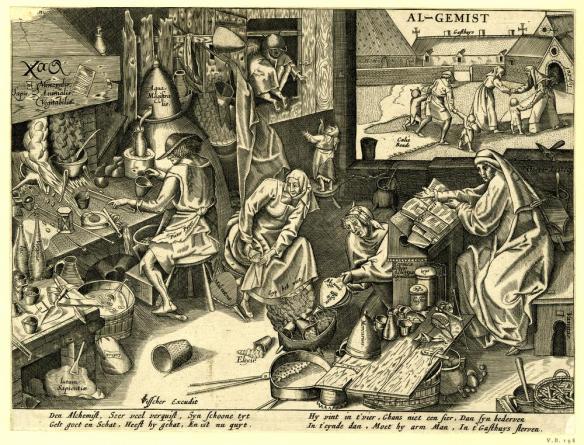
The Alchemist; alchemist working at stove at left, robed figure reading instructions from manual at r; a fool with bellows and the alchemist’s wife with an empty purse in centre; in right background, alchemist and his wife taking their three children to the hospital, identified with inscription over the door. The scene – a message of timeless value – illustrates man´s folly chasing after the illusion of transforming worthless objects into gold with such vigour that he ruins his family. Dressed in shreds, he places a coin into a bowl while a scoundrel stirs the fire at his side. He remains unmoved by his wife who opens her empty purse, his children in their desperation hide in an empty wardrobe. A scholar sitting on a bench writes his report in a manuscript whose outcome is seen in the background as a painting within a painting where the family is being led to the poor house.
When the meaning offered us excludes obvious facts, direct experience, and our hearts’ recognition of truth, no wonder so many of us lapse into nihilism, thinking that life and the universe itself is meaningless. That nihilism and the latent despair that drives it was QAnon’s spawning ground. The same ground spawns mindless consumerism, technology fetishism, the hypnotic myth of progress, and the spectacular psuedo-dramas of politics, sports, and entertainment. These are the spawn and also the ground, comprised within what Guy Debord named “The Society of the Spectacle.” Any edifice of meaning collapses around the hollow core of its fundamental inauthenticity.
The hunger for the real that gnaws at the Spectacle’s subjects cannot be met from within the Spectacle itself. Online experiences may assuage the nihilism and despair, but they cannot fully meet it. Only direct, sensory, multi-dimensional relationship can. Ultimately this, and not intellect, is the source of meaning.
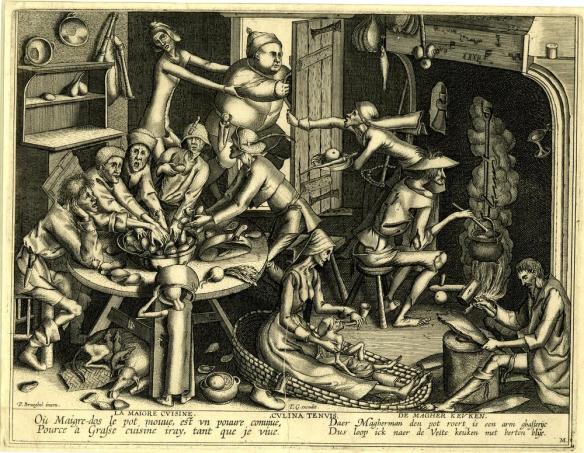
The Poor Kitchen; a group of gaunt men gather around a table at left and reach for a pot of mussels, while behind them a fat man attempts to escape the grasp of a thin man through the door at the back of the room; other thin men at fireplace at right and softening dried fish at right foreground; in centre a thin woman feeds a child while another child upturns an empty pot over his head;

The Rich Kitchen. several large men sit around a table laden with meats and pies; behind them to the left several pots of food and a pig roast over a large fire; in the foreground a rotund woman nurses a pudgy baby and two children eat bread soaked in milk from a full trough; in the background a large man shoos a thin man with a bagpipe from the door; reversed copy within a double trait carré
The Black Pill is the distillation of cultural despair. It spreads from one dispossessed person to another, leaching its poison into the body politic. The frustrated desire of the Incels morphs easily into racial hatred and sexual violence. The nihilism of the Black Pills finds relief in grandiose fascist stories of past and future greatness.
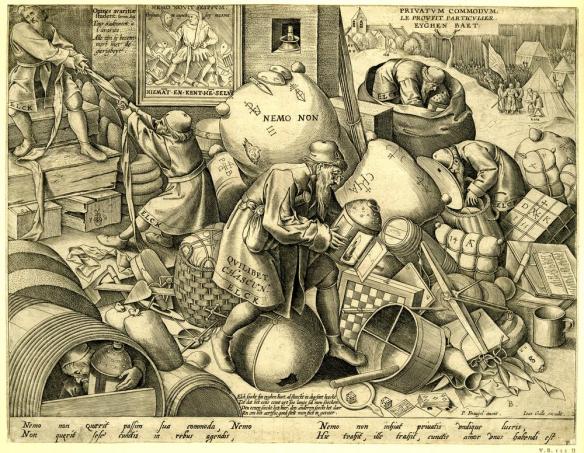
Elck (Everyman). A bearded, near-sighted man searches with a lantern through barrels, baskets and sacks in the centre foreground; the same figure appears again in the left foreground in a barrel, twice in the right middleground, and in the left middleground where he is engaged in a match of tug-of-war with another man; various sacks and parcels are inscribed with owners’ marks; dice and cards are strewn in foreground
The situation is closely analogous, as Chris Hedges describes it, to 1930s Germany, where just as today “…the spiritually and politically alienated, those cast aside by the society, [were] prime recruits for a politics centered around violence, cultural hatreds and personal resentments.” Their rage, he observes, then as now, was directed in particular at the liberal political intellectuals who had abdicated their proper role within capitalism, which is to soften its rough edges, mitigate its worst tendencies, and wrest a fair share of its wealth for the working class. American liberals performed that role admirably from the 1930s through the 1960s and even into the 1980s, before, as Hedges puts it, they “retreated into the universities to preach the moral absolutism of identity politics and multiculturalism while turning their backs on the economic warfare being waged on the working class and the unrelenting assault on civil liberties.” In the 1990s the Democratic Party (like Labour in the UK and various social democratic parties in Europe) began to romance Wall Street and the transnational corporations. They consummated their marriage in the Obama era and bore a child called totalitarian corporatism, which vies with its rival, Trumpian neofascism, for our future.

The closeness of the election shows that these two futures hang in near perfect balance. Is there a third option? There is, but it depends on building bridges across the most forbidding fault lines of our fragmenting social landscape.
The Incels, Black Pills, and QAnons show us in magnified form the dispossession of a vast swath of middle America (dispossessed of hope, meaning, and belonging, and increasingly economically dispossessed as well). They join the traditionally dispossessed racial and ethnic minorities, but not, tragically, as their allies. Instead they turn their rage on each other, leaving little energy to resist the continued plunder of the commons. The two main cults each offer their followers a proxy target – a caricature of the other side – for their rage.
In light of this tacit collusion, one wonders if both are not two arms of the same monster.
The Tide of our Times
For any of this to change, we must be willing to see past the caricatures. Caricatures are not without truth, but they tend to exaggerate what is superficial and unflattering while ignoring what is beautiful and subtle. Social media, as described in Netflix’s documentary The Social Dilemma, tends to do the same, chiefly by herding users into reality-proof echo chambers and keeping them on-platform by hijacking their limbic systems. They are part of the apparatus that channels popular rage – a precious resource – into populist hate. QAnons and Black Lives Matter protesters actually have a lot in common, starting with a profound alienation from mainstream politics and loss of faith in the system, but having been maneuvered into false opposition they cancel each other out. That is why compassion – seeing the human beneath the judgments, categories, and projections – is the only way out of the social dilemma.
Compassion is the tide of our times. Perhaps that is why increasingly furious attempts to sow hatred are required to maintain the psychic conditions for a control-based society. It takes more and more propaganda to keep us divided. A person in the online community I host described her stint going door to door in Iowa as an Andrew Yang campaign worker. Her strongest impression was of an intense desire among these common folks for unity, an end to the strife. Maybe we are closer to social healing than online behavior, with its vitriol and venom, would indicate. Hate is usually louder than love – in society and within ourselves. What will happen if we listen to the quieter voices?
Underneath the distorted and betrayed hopes of the QAnons lies the authentic hope that had to be there in order to be betrayed and distorted in the first place. It is the same hope that came out with Obama’s election: change, a new beginning. It is the same hope that Trump invoked: Make America great again. Today the same perennial hopefulness rises again among Biden voters.
How can the same hope animate forces that seem diametrically opposed? It is because the distorting lens of us-them thinking diffracts it into two, making us think that change will come through defeat of the enemy presented us. Dehumanization is a primary weapon of war (making the enemy despicable), just as it is the template of racism, sexism, and the reduction of all that is sacred. It is precisely the opposite of what is needed if we are ever to pull together.
For cliches about solidarity, unity, coherence, and reconciliation to become real, we have to look into the dark mirror of all we judge. We have to learn to draw meaning from a new story that isn’t about triumph over the Other. We have to put down the lenses of judgment and ideology, to see with new eyes the people and information our stories had banished. That is how we will forge an unstoppable populism. Let the unlearning begin.
Note:Pieter Bruegel the Elder Drawings and Prints
 “see friends man has known this for many years”
“see friends man has known this for many years”
One of the greatest Netherlandish artists, Pieter Bruegel the Elder (1525/30-1569) is best known today for his paintings of peasant life. Yet it was above all through his exceptional graphic work that he achieved widespread fame during the sixteenth century. His drawings and the prints made after his designs, while based on traditional sources, are innovative and independent, and they are wide ranging in their subject matter. Read here
the greatest Netherlandish artists, Pieter Bruegel the Elder (1525/30-1569) is best known today for his paintings of peasant life. Yet it was above all through his exceptional graphic work that he achieved widespread fame during the sixteenth century. His drawings and the prints made after his designs, while based on traditional sources, are innovative and independent, and they are wide ranging in their subject matter. Read here

- Free yourselves of mental slavery – part 3
 The scenario is bleak: Consumerism and materialism dominate all aspects of social life. Older people look with alarm at the crumbling of civic and religious institutions. Young people view the future with a sense of foreboding. Politicians appear self-interested, religious leaders hypocritical, business people ever more corrupt. Violence is escalating at home and abroad, with no ready solution in sight. Alienation and disorientation are pervasive.
The scenario is bleak: Consumerism and materialism dominate all aspects of social life. Older people look with alarm at the crumbling of civic and religious institutions. Young people view the future with a sense of foreboding. Politicians appear self-interested, religious leaders hypocritical, business people ever more corrupt. Violence is escalating at home and abroad, with no ready solution in sight. Alienation and disorientation are pervasive.
Whatever similarities we may find in our contemporary predicament, the society I’m describing is 14th-century Germany. As in 21st-century America or the world, many people of the time, feeling battered by the world around them, sought spiritual wisdom and a more profound connection to the divine. In the early 1300s, this meant that a large number of practicing Christians, laypeople and clerics alike, were searching for a more direct and satisfying experience of God’s presence than what they found in familiar institutional practices.
The potential chaos embodied in these grassroots, subjective movements alarmed some Church leaders. From his seat in Avignon, Pope John XXII, while mostly concerned with matters of state, sought to rein in both the “radical” Franciscans, who preached the importance of apostolic poverty, and the women known as beguines, who formed what we would today call intentional religious communities — groups of spiritually likeminded laypeople, rather than members of a formal religious order, who lived and prayed together.
- Meister Eckhart, a Mystic for Our Time
 In the midst of this tumult, many Christian seekers in the Rhineland of what is today western Germany found life-altering wisdom in the preaching of a Dominican friar, Eckhart von Hochheim, better known as Meister (“Master”) Eckhart. An acclaimed scholar trained at the University of Paris, Meister Eckhart sought to bring the fruits of his many years of theological and philosophical study and contemplation to lay audiences — an unusual aspiration among priest-scholars, who typically considered such matters beyond the comprehension of average people.
In the midst of this tumult, many Christian seekers in the Rhineland of what is today western Germany found life-altering wisdom in the preaching of a Dominican friar, Eckhart von Hochheim, better known as Meister (“Master”) Eckhart. An acclaimed scholar trained at the University of Paris, Meister Eckhart sought to bring the fruits of his many years of theological and philosophical study and contemplation to lay audiences — an unusual aspiration among priest-scholars, who typically considered such matters beyond the comprehension of average people.
Even more revolutionary was Eckhart’s message. Unlike most preachers of the day, who focused on sin and eternal punishment, he described a process he called “the divine birth,” in which true believers could experience God directly within them.

The key lay in letting go of all worldly things, all desires and preconceptions — even one’s image of God himself: “The more completely you are able to draw in your powers to a unity and forget all those things and their images which you have absorbed, and the further you can get from creatures and their images, the nearer you are to this [divine birth] and the readier to receive it.”
Then, he said — “in the midst of silence” — God would come within the soul.
Meister Eckhart’s way to “know” God directly was shaped by two central insights, the products of many years of study and contemplation. The first was that the seeker must “unknow” everything he or she thinks about God. Human language and images are essentially metaphorical, comparing things to one another. But God is completely other.
Obviously he is not an old man with a flowing white beard (or even a “he”), but he is also not a being in the sense that we normally mean. It is more accurate, according to Eckhart, to say that God is Being itself, since all existence derives from him.
“We should learn not to give God any name . . . for God is above names and ineffable.” In fact, Eckhart warns, “if you think of anything he might be, he is not that.” This deconstruction of images of God, in which we come closer to knowing the ineffable divine by negative attributions — God does not exist in time or space, for instance — than by positive attributions, is known as negative theology, a tradition dating back to St. Augustine.
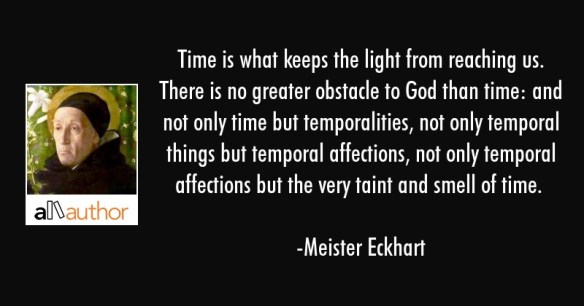
God’s “unknowability” in word and image was a hard concession for a professional scholar who had invested himself in coming to know God through a rigorous probing of Scripture and Catholic tradition. But the more that Eckhart had tried to approach God rationally, the more frustrated he had become. Instead he came upon a second key insight: One could “know” God through direct experience. Later scholars would call such an approach “mystical,” but a more accurate and less loaded term for what Eckhart meant would be “intuitive”: Rather than trying to know God from the outside, through our senses and intellect, we should try to know him from the inside, from that divine presence already within each of us.
Eckhart called this presence “the divine spark.” He preached that, through a contemplative process of self-emptying, or “letting-go-ness,” the seeker will directly encounter the God within. Only with the death of the old and false self, in theological terms, could the new and true self be born.
The concept traces to St. Paul, who directed Christians to “put away the old self of your former way of life, corrupted through deceitful desires, and be renewed in the spirit of your minds, and put on the new self, created in God’s way in righteousness and holiness of truth.”
In Eckhart’s interpretation, the resulting “divine birth” represented no mere metaphor but a direct encounter of the individual soul with the divine. The best news was that God was eager to fully embrace the seeker: “You need not seek him here or there,” he wrote. “He is no further than the door of your heart; there he stands patiently awaiting whoever is ready to open up and let him in. No need to call him from afar: He can hardly wait for you to open up. He longs for you a thousand times more than you long for him.”
Eckhart’s message both excited and unnerved the Christians of his day. Although he never denigrated the external forms of piety around him — he was an active priest — his focus on the internal, on contemplation, was highly unusual, even unsettling to many lay listeners. The Church they knew preached that each person’s salvation depended on the performance of good works and acts of contrition, yet these were absent from Eckhart’s teaching. The Church they knew revolved around the veneration of saints and the celebration of sacraments, yet these played no apparent role in the internal self-transcendence Eckhart described. The Church they knew esteemed monks, nuns and other contemplatives as closer to God than the layperson, yet Eckhart preached that direct experience of God was accessible to any true seeker, regardless of social or religious status.

It is a testament to the truly “catholic”(καθολικός (katholikos), meaning “universal” meaning “all embrasing) nature of medieval Christianity that what Eckhart called “a wayless way” to divine union — and subsequent commentators would call apophatic or imageless mysticism — coexisted peacefully with Eucharistic devotions, pilgrimages and penitential self-flagellation. Not until late in his life did Eckhart become caught up in an inquisitorial procedure, based largely on local politics, that culminated in several of his statements being condemned in a papal bull as “evil-sounding.” After eliminating these more controversial statements, his disciples Johannes Tauler and Blessed Heinrich Suso continued to attract followers after the master’s death in the late 1320s. Still, after several decades the master himself faded into obscurity.
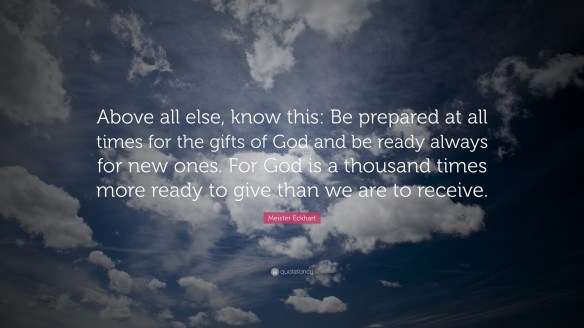
Fast forward seven centuries and the medieval Dominican friar has emerged as something of a modern spiritual celebrity. Millions of Roman Catholics and other Christians now claim Meister Eckhart as one of their own, not to mention many Zen Buddhists, Sufi Muslims, Advaita Vedanta Hindus, Jewish Cabalists and a variety of other seekers who describe themselves as “spiritual but not religious.” In the United States, interest in Eckhart owes much to the popularity of his namesake, Eckhart (born Ulrich) Tolle, a spiritual teacher and author whose beliefs weave together the medieval master’s teachings with an eclectic blend of contemporary Eastern and New Age concepts. Thanks in part to the massively influential endorsement of A New Earth: Awakening to Your Life’s Purpose by Oprah’s Book Club, the modern Eckhart’s books have together been translated into more than 30 languages and sold some 10 million copies worldwide.
What is it that all these people see in the words of this sage from a distant era? The most common denominator appears to be an attraction to Eckhart’s revolutionary method of direct access to God (or, for some, to ultimate reality) — a profoundly subjective approach that is at once intuitive and pragmatic, philosophical yet non-rational, and above all, universally accessible. Many modern Christian authors, such as the Franciscan priest Richard Rohr — who calls Eckhart a “mystic’s mystic” — view his teachings as part of a long Christian contemplative tradition.
Despite that noble pedigree, Meister Eckhart was late to gain notice among modern Christians. His attractiveness to many contemporary Catholics ironically owes much to the post-Vatican II Church’s intensified engagement with other world religions. The Council’s 1965 declaration Nostra aetate (“In Our Time”) is best known for its repudiation of Catholicism’s long tradition of anti-Semitic statements, but it also represented the Church’s first genuine outreach to Islam, Buddhism, Hinduism and other non-Christian religious traditions. By a vote of 2,221 to 88, the Council affirmed that the Holy Spirit can indeed be at work in these faiths as well, although obviously not to the same degree as in Christ’s ordained Church.
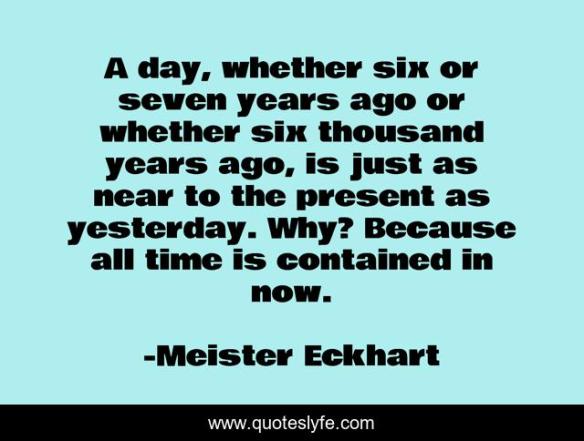
Already by that time, several Catholic thinkers had begun to explore affinities with non-Christian religions, particularly those of Asia. One of the most famous of those spiritual explorers, the Trappist monk Thomas Merton, engaged extensively with Zen Buddhist teachings before discovering a strikingly similar approach already present within his own tradition: Meister Eckhart. Merton agreed with his frequent correspondent, the Japanese scholar D. T. Suzuki, who called Eckhart “the one Zen thinker of the West.”
At the same time that medieval Japanese monks were formulating the core of Zen teaching, Eckhart drew deeply on centuries of Christian, Jewish, Muslim and pagan thought to develop a remarkably similar approach to experience of the divine. “Letting-go-ness” lines up with the Zen “no-mind” (wuxin) as well as the Taoist “no action” (wu wei). Buddhists also appreciate the master’s distinction between the constructed individual identity of each person — what we would call the ego and Eckhart calls the “false self” — and the common nature we all share, the authentic self, which the master identified as divine.
Like his Zen counterparts, Eckhart was wary of God-talk, which he thought more often obscured than revealed the divine, and he aspired to a unity with the ultimate. He called this a “second” or “divine” birth, which is in many ways similar to the Buddhist notion of satori, or enlightenment. The resulting “Christ nature” that he described, echoing St. Paul in Galatians 2:20 (“It is no longer I who live, but Christ who lives in me”) looks remarkably similar to the internal “Buddha nature” of the Mahayana tradition.
At the same time, Eckhart’s embrace of meditation anticipates by seven centuries its popularity, along with the practice of “mindfulness,” among people of faith as well as among the ever-growing number of New Age seekers, agnostics and avowed atheists and others who list their religious affiliation as “none.”

Obviously many important differences remain between the Catholic Eckhart and other faith traditions, most notably on the role and identity of Christ. But the significant convergences have attracted increasing attention since the 1960s. In that sense, Eckhart, whom Merton called “my life-raft,” has brought the contemplative tradition to non-Catholics while deepening the modern Church’s ecumenical dialogue with other spiritual traditions.
Note: Meister Eckhart’s Sermons
Meister Eckhart’s Sermons contains some of his short sermons.The sermons themselves are in relatively plain English. In them, Eckhart flirts with some controversial topics. He describes the soul as “laying hold” of God in a mystical manner, so that there is “no distinction” between God and the soul. Indeed, some of his more radical teachings were eventually condemned by a papal council as heretical. But Eckhart does illustrate a way to synthesize one’s religious belief with one’s philosophy. Interesting and demanding, Meister Eckhart’s Sermons will challenge a person’s conception of God and religion. Read here
Of course, not all Catholics would view the similarity of Eckhart’s teachings to Zen Buddhist practices as a recommendation. While more ecumenical Catholic writers such as the priests Aelred Graham, OSB, Robert E. Kennedy, S.J., and Richard Rohr celebrate the affinity, other more conservative thinkers, such as James Hitchcock, have remained cautious about a full embrace of the medieval friar (particularly given Eckhart’s sermons on the Godhead, in which detractors detect hints of pantheism).
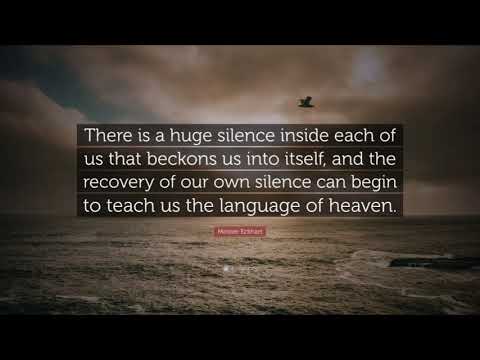
“Mysticism” also remains a suspicious concept for many modern people, given its popular association with visions and other supernatural experiences. But Meister Eckhart never claimed any special powers or called himself a mystic — or anything other than a Catholic preacher of the gospel. If he was a mystic, he was a profoundly anti-obscurant, egalitarian and down-to-earth one, rooted in centuries of Catholic contemplative tradition. In that sense he may be the perfect mystic for our own troubled times.
Here THE COMPLETE MYSTICAL WORKS OF MEISTER ECKHART
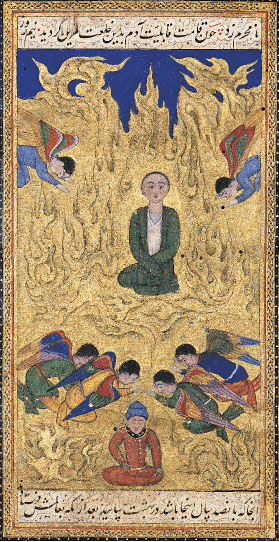
Persian sufi miniatures :Angels submission to Adam ( In front Satan refusing)
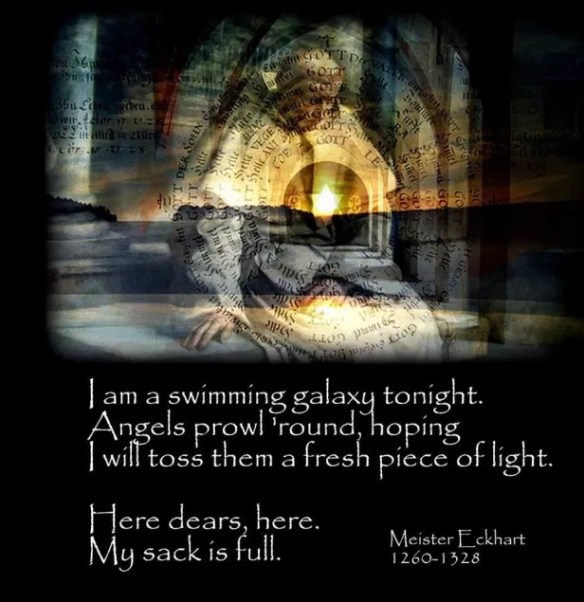
- Interreligious Dialogue: Ibn ‘Arabi and Meister Eckhart
Finding a Single Essence for Religions
As the last major world religion, Islam has continually compared itself with other religions and, more than any other, it seeks opportunities for dialogue and addresses in particular the followers of other Abrahamic religions, i.e. the people of the Scripture. As the basis for this dialogue, Islam refers to the same thing that we consider to be the essence of religion. And that essence has to do with faith, belief and content and not with the act and the form:
Say: O people of the Scripture! Come to an agreement between us and you: that we shall worship none but Allah and that we shall ascribe no partner to Him, and that none of us shall take others for Lords beside Allah. (The Holy Quran, 3:64)
And argue not with the people of the Scripture unless it be in [a way] that is better, save with such of them as do wrong; and say: We believe in that which hath been revealed unto us and revealed unto you; our God and your God is One, and unto Him we surrender. (Q. 29:46)
The one idea that religions have in common, and on the basis of which they can enter into dialogue, is “God” – and a belief in Him, which lies at the heart of the religion, and is behind all the apparently different forms of Divine Law. As Jelaluddin Rumi suggests, it is this very essence which is hidden behind the apparent world.
This single essence not only paves the way for dialogue but satisfies the contemporary human as well. It is this very essence which permeates human nature and is at the root of the human soul. It can be reached through Friendship (wilaya), which is personified in Christianity as Jesus Christ, and it occupies an important place in Islamic mysticism. Consequently, in the dialogue between religions, we should start from the perspective of religious mysticism. For, according to some scholars, “of all kinds of human thought, mysticism is almost always and everywhere the same. And this is why others have also regarded mysticism as a solution to today’s problems, claiming: “Never before in history was it more urgent for all of us to learn the language of the mystics than in our time, when division threatens to destroy us. The mystics of every tradition speak a language that unites. Equally it is claimed that: “Mysticism is the same in all ages and in all places; timeless and independent of history it has always been identical. East and West and other differences vanish here… For one and the same experience speaks here, only by chance in varying dialects East is west and West is east.
Absolute Truth and Believed Truth
Ibn ‘Arabi and Meister Eckhart’s tolerance for different ideas originated, as mentioned above, from their knowledge of God, for God is too great to be contained in a view that is the product of limited human thought.
Presence of Sovereignty is indifferent
Transcendent from imaginary syllogisms.
According to Ibn ‘Arabi, everyone worships a god who is a product of his own imagination; in other words, he determines what God is in his own beliefs:
God is created in the belief of His bondsmen. For, when a person rationally considers God, he creates what he believes in himself through his consideration. Hence he worships only a god which he has created through his consideration. He has said to it “Be!”, and it has come into existence. That is why God commanded us to worship the God brought by the Messenger and spoken of in the Book. For if you worship this God, you will be worshiping your creator, and you will have fully given worship its due.
Evidently, the God of whom the prophets speak is not more than a single God. Meister Eckhart expresses himself in ways that are in perfect agreement with Ibn ‘Arabi:
A man ought not to have a God who is just a product of his thought, nor should he be satisfied with that, because if the thought vanished, God too would vanish. But one ought to have a God who is present, a God who is far above the notions of man and of all created things.
However, it should be noted that the gods who appear in human ideas and in whom human beings believe, and whom Ibn ‘Arabi calls “believed gods”, are the manifestations of the same One God in various thoughts and constitutions. It is not wrong to believe in such a god: the mistake is committed when this “believed Truth” is regarded as the absolute Truth, and anything else is denied. The perfect mystic is aware of this very point and believes in God in all His manifestations.
The fact that human beings determine who and what God is by their beliefs, and deny other manifestations of God in other beliefs, is the content of hadiths in which it has been said that on the Day of Resurrection, God will appear to His servants and these servants will accept only that form of God which is in harmony with their constitutions, natures and reasons, and they will deny other forms. In Ibn ‘Arabi’s words:
At the Resurrection, the Real (God) will disclose Himself and say, “I am your Lord”. They will see Him, but nevertheless they will deny Him and not acknowledge Him as their Lord, despite the existence of vision because of the lifting of the veil. When He transmutes Himself for them into the mark through which they recognize Him, they will say to Him, “Thou art our Lord”. Yet He is the one in whom they were seeking refuge, and He is the one they confessed to and recognized.
Read more Interreligious Dialogue: Ibn ‘Arabi and Meister Eckhart

